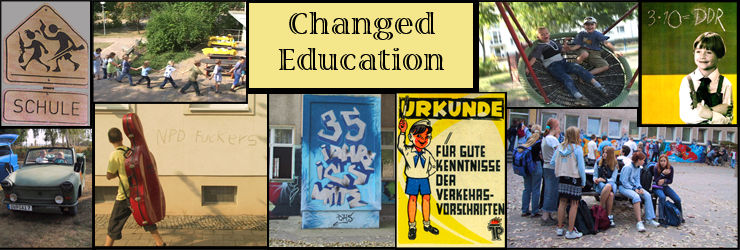Eyewitness Videos • Changed Education

What kind of school did Siegfried attend in the GDR? What did it allow him to do? What is he referring to when he mentions "some constraints on one's freedom"? How would you have felt if you had been in his position? When making decisions on his career, what did Siegfried have to do "three times"? What choice was he given if he wanted to study his preferred discipline? Why did that option not interest him? How did a (possibly) fortuitous personal connection determine his future? Was the career he eventually embarked upon his dream job? What do you think about Siegfried's story? What does it say about access and equity for all in the GDR?
Sequence 2: Yvonne
Yvonne experiences the GDR as a very young girl. What does she remember about her schooling experience in the GDR that seems to be different from her younger brother's primary school experience in the new system? Do you think her memories of GDR primary schooling are positive or negative? What examples does she cite? Do you think she remembers GDR afternoon school activities being helpful or burdensome? Why didn't parents pick their kids up right after school let out in the GDR?
Sequence 3: Rudiger
In the post-Wende school system in the new federal state of Mecklenburg, at what point are kids sent to different school types? What does Rudiger seem to think of that? What do you think of that? How was it different in the GDR? Rudiger says "the children have changed a lot" since the Wende. What information does he provide to support his observation? Are you surprised when he contends that "none of these problems affect their motivation"? Do you think he's trying to put a positive spin on a bad situation, or do you believe him? What does he say he has to do differently as a teacher now?
Sequence 4: Yvonne
How were students of stronger and weaker academic ability handled in Yvonne's GDR school (die Polytechnische Oberschule, Polytechnic Secondary School), versus how were they handled in the school after reunification (die Gesamtschule or Comprehensive/integrated Secondary School)? What do you think the GDR's rationale was for setting up secondary schooling this way? What about the West's rationale? Which school setup to deal with students of differing ability levels do you think is best?
Sequence 5: Anila
What does Anila say is good today? What does she have difficulty with? Do you think this is perhaps just a function of who she is, or a systemic problem perhaps shared by other citizens of the former GDR? Do you get the sense she is happy and satisfied in the new system, or not? Does her difficulty make sense to you? Do you ever feel that way, too?
Sequence 6: Robert
Do you think Robert is a West German or an East German? Why? What did his university do in the early "transitional period" after the Wende? Do you think that was a necessity? If so, why? Do you think it was a good idea? Now that he says "the time of consolidation is over", where has Robert primarily focused his efforts as director of the university? What is he most proud of? As his university now moves into the future, what does Robert say is its biggest challenge? Why? What is he concerned about in the coming years? How do you think his situation in eastern Germany might be different from that faced by, say, his counterpart at Northwestern University?
| Historical Overview | Victims and Perpetrators |
| Economic Upheaval | SED Successors |
| Societal Upheaval | Women and Religion |
| Right-wing Fears | Changed Education |
| Stasi Legacy | GDR Reflections |